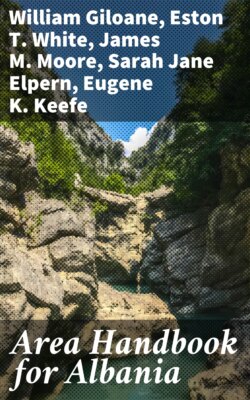Читать книгу Area Handbook for Albania - Stephen Peters - Страница 4
На сайте Литреса книга снята с продажи.
PREFACE
ОглавлениеTable of Contents
Albania, or, as it proclaimed itself in 1946, the People's Republic of Albania, emerged from World War II under the control of the local Communist movement, which later adopted the name Albanian Workers' Party. The most remarkable feature of Albanian life during the 1960s was the rigid alignment with Communist China in that country's ideological struggle with the Soviet Union. In mid-1970 the country continued to be Communist China's only European ally and its mouthpiece in the United Nations. Propaganda broadcasts in several languages, extensive for such a small, undeveloped country, continued to emanate from the capital city of Tirana, constantly reiterating the Chinese Communist line and making Radio Tirana sound like an extension of Radio Peking.
Albania's most notable tradition from ancient times has been one of foreign domination. Brief periods of independence have been overshadowed by long centuries of subjection to alien rule. Foreign rulers never seemed able or willing to subject the Albanian peasants to the complete authority of a central government. Throughout their history Albanians, protected by the remoteness of their mountain villages, often enjoyed a measure of autonomy even though they lacked national independence. The foreign domination plus the limited autonomy developed in the people a spirit of fierce independence and a suspicion of neighboring states that might have designs on their territorial integrity.
Militarily undeveloped but unwilling to submit to partition by its neighbors, Albania has held on precariously to autonomy since World War II by becoming a client state—first to Yugoslavia, then to the Soviet Union, and then to Communist China. In all three relationships Albania has maintained its independence but it has not been able to establish itself as a viable economic entity.
The Area Handbook for Albania seeks to present an overview of the various social, political, and economic aspects of the country as they appeared in 1970. The leaders of the Communist Party have gone to extremes to maintain an aura of secrecy about their nation and their efforts to govern it. Material on Albania is scanty and some that is available is not reliable but, using their own judgments on sources, the authors have striven for objectivity in this effort to depict Albanian society in 1970.
The spelling of place names conforms to the rulings of the United States Board on Geographic Names, with the exception that no diacritical marks have been used in this volume. The metric system has been used only for tonnages.
